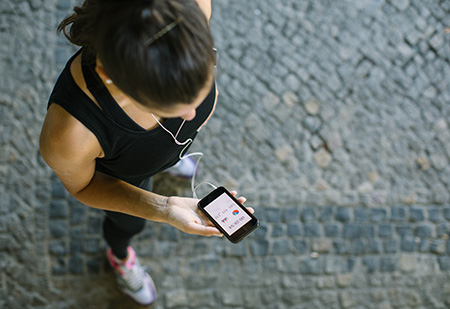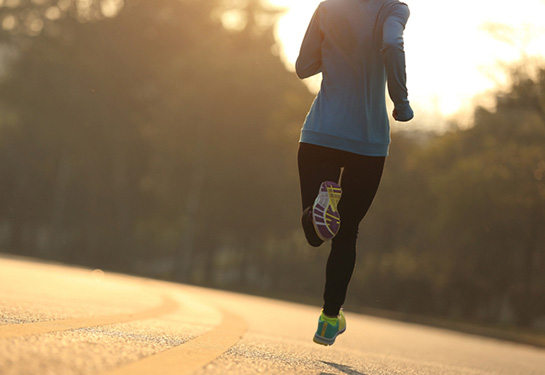Pick up the pace: Exercise intensity matters more for your health than steps
On World Exercise Day, we learn from UC Davis molecular exercise physiologist Keith Baar how our body responds to physical activity and why intense exercise is better for your heart than walking more steps. Baar is a professor in the Departments of Neurobiology, Physiology and Behavior and of Physiology and Membrane Biology.
Why is exercising so critical for the body?

Even with perfect nutrition, your body will lose muscle and fitness if you are on bed rest or not exercising enough. Physical inactivity has a huge effect on our body. It causes approximately 16% of deaths in the U.S. annually. Not only does exercise keep us alive, the more fit we are, the better we are at breaking down potential toxic chemicals that destroy nerve tissues and drive depression and dementia.
It’s very clear that despite a good diet and normal weight, people can still have a much higher risk for chronic diseases if they’re not fit. The big thing is to combine a level of healthy activity with a diet that allows you to maintain a healthy body weight.
Some suggest walking 10,000 steps a day or half an hour a day. What is your recommendation on daily exercise?
Studies show that walking 8000 steps a day has a dramatic effect on all-cause mortality. Yet, any walking is better than not doing anything.
In an even cooler study from Copenhagen, they studied people who were cycling to work. They asked, if you have a longer bike commute, does that have a beneficial effect and you live longer?
Or when you're on your bike commute should you go faster? In essence, they asked whether benefits were greater with the intensity or the duration. They found that intensity was better and more important. Individuals who commuted faster added like five years to their life expectancy, whereas those who went further saw no additional benefit. Therefore, adding some high intensity exercise is really important.

We know that exercising is also good for the heart. Are some exercises better than others for the heart?
Jeremy Morris led the earliest studies on physical activity and heart disease. He first compared heart disease deaths between drivers and conductors of the London Transport Executive. The bus drivers drove all day with minimal physical activity, while the conductors went up and down the stairs in the double decker buses to check on tickets. The study found that conductors whose work required high physical activity and lots of climbing stairs had lower rates of coronary heart disease.
Morris did a follow-up study looking at the risk of heart attack among postal workers. He compared the risk in heavy exercisers, such as those who delivered the mail by walking or riding bicycles, to light exercisers, such as the clerks behind the window at the post office and the telephone operators. He found that the deliverers had a far lower risk of heart attack.
Another study compared those mail carriers to “heavy laborers” who moved heavy weights as part of their work. That study found that those who lifted and moved heavy items showed better heart health. So, once again the intensity is really important.
The point is, we need to be physically active to help the heart work better and some of that work needs to be at a high intensity.
It’s very clear that despite a good diet and normal weight, people can still have a much higher risk for chronic diseases if they’re not fit.” —Keith Baar, UC Davis molecular exercise physiologist
As for the best type of exercise, I would say it has to be the one with a resistance element. This type of exercise makes your heart work against a heavy load or a lot of pressure. For example, when you lift something, especially with your legs, your heart must work against a greater pressure. This makes your heart get stronger.
Resistance exercise is good if you could do it a few times weekly. If you have chronic high blood pressure, you will want to be careful and concentrate on breathing to minimize the rise in pressure. High intensity exercise, whether it's strength training, going fast on your bike, climbing stairs, or lifting weights, have a better effect on your heart than if you just walk on the flat ground.
What’s your advice to people who work behind a desk or don’t get the chance to do serious exercising?
They always tell you park a little further and walk more, but that will only give you a few extra steps. It doesn't really do much as far as the health of your heart.

I would say, when you're commuting on foot or bike, make your commute fast. If you're walking, walk quickly to get higher return on your time. If you're riding your bike, go a little faster than you feel comfortable.
Also, I would recommend taking a 5-minute break every hour. Get up and move around, ideally take the stairs. Basically, if you've got multiple floors in your building, climb the stairs a couple of times a day - the more floors the better.
Finally, if you could do just some body weight exercises in the office, like a series of one-legged and two-legged squats, that's a great option. Adding some squats maybe a few times a day would have a great effect.
Three steps to better health:
• Do a few sets of squat series
• Climb the stairs during the break
• Walk or ride the bike a bit faster than you feel comfortable.





